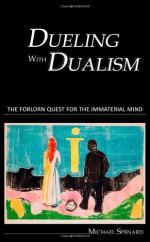|
This section contains 7,713 words (approx. 26 pages at 300 words per page) |

|
Mind-body dualism is the doctrine that human persons are not made out of ordinary matter, at least not entirely. Every person has—or, on many versions of the view, simply is identical to—a soul. A soul is said to have little in common with human bodies and other material objects but is in one way or another responsible for a person's mental life.
Mind-body dualism is sometimes called "substance dualism," to distinguish the view from "property dualism"—the thesis that mental properties (such as being in pain, thinking of Vienna) are in some way significantly different from or independent of physical properties (such as having neurons firing in one's brain in a certain pattern). Property dualism is meant to allow for what is often called "dual-aspect theory": persons are material objects with a nonphysical, mental "aspect" but...
|
This section contains 7,713 words (approx. 26 pages at 300 words per page) |

|


